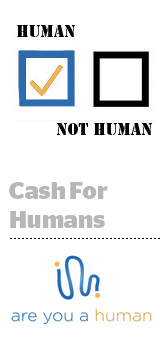 Are You a Human is looking to up its human headcount.
Are You a Human is looking to up its human headcount.
The digital security and human traffic verification company plans to spend the majority of its $4.2 million in Series A cash, announced Thursday, to roughly double its current headcount from 25 to around 50 by the end of the year.
The fresh injection, led by Detroit Venture Partners with participation from MDC Dream Ventures, Foundry Group Angels and NCT Ventures, brings Are You a Human’s total funding to $5.2 million.
Founded in 2011 as a creative CAPTCHA company, today Are You a Human’s technology centers on what it calls the Verified Human Whitelist, which, as its name indicates, aims to create a list of authenticated users that advertisers and publishers can use to know whether or not their site visitors are human.
It’s a common way to tackle the bot problem. Rather than finding and blocking bots – according to a recent report from Distil Networks, just 41% of all web traffic is human, with so-called “bad bots” driving 22% of all Internet traffic – the whitelist aims to identify and authenticate real people.
Are You a Human CEO Ben Trenda likened the whitelist to a sort of digital TSA PreCheck program through which “users who are pre-verified get to have the most seamless experience, whereas others get more rigorously screened.”
“We thought it was curious that every existing solution is fundamentally based on a belief that you can find and block bots,” Trenda said. “By way of an analogy, no country in the world would build a border security program that starts with a block list alone, because it’s much easier to give a passport to the people you want to let in than it is to identify a larger number of people that you don’t. A block list has its place, but it’s not the foundation.”
The whitelist works like this: Are You a Human first placed code on around 1.5 million websites, including AOL and Yahoo, to observe natural human behavior. Each time a user behaved in a “humanlike way” on a website – by making a purchase, watching a video, reading an article or one of several hundred other related signals – that represented one data point suggesting a particular user might be a human.
Once a user had demonstrated his or her humanity “consistently and without fail enough times,” Trenda said Are You a Human would add that person to the whitelist. Following their initial authentication, users are then reverified multiple times daily.
“Sophisticated bots can fool any verification system on one page view or a few page views,” Trenda said. “But it would be exceptionally difficult to devise a bot that could consistently appear human across the entire Internet when the bot developer doesn’t know what we’re looking for on every page of those 1.5 million sites.”
The company claims to have authenticated more than 200 million people and counting, observing a 50% and higher lift in engagement when content is filtered to verified humans.
But what happens when Are You a Human detects a bot passing for a person? That depends on who’s using the whitelist and for what purpose.
Most advertisers and agencies use the whitelist as a filter, similar to how one might use a third-party data segment, which Trenda referred to as “a side effect of a more fundamental issue – the lack of appropriate pathways for automated traffic.”
Harking back to his TSA PreCheck program comparison, it’s Trenda’s contention that there should be one user experience for humans and a different experience for non-humans – pre-checked users to be given a seamless experience, while unverified would be more rigorously screened.
Take good bots, for example, which Distil Networks estimate are responsible for 36% of overall web traffic. Good bots aren’t nefarious – it’s their job to crawl, search and index rather than steal, scrape or pirate – but they do still muddy the waters. And it certainly doesn’t make sense to burn bandwidth by serving rich graphic content and ads to a friendly robot.
“If we make it extremely simple for anyone offering commerce, media or other services on the Internet to know, as the page request comes through, whether or not the user is a verified human, the site can then create any rules they see fit about the experience they want to offer these very different user groups,” Trenda said.
Headquartered in Detroit with an office in New York, Are You a Human also intends to set aside some of the funding money to open locations in San Francisco and London later this year.











